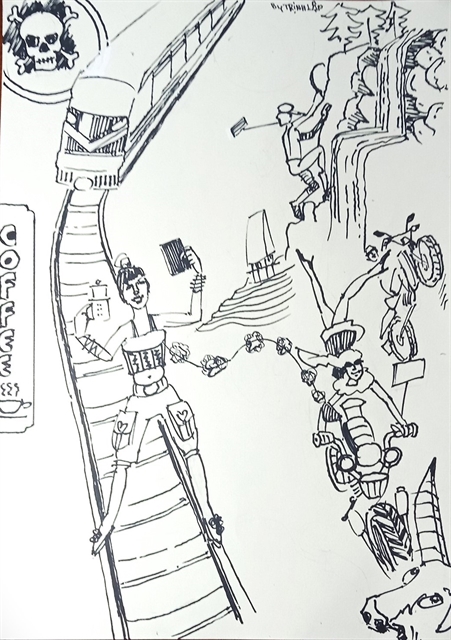 Talk Around Town
Talk Around Town

 |
| Illustration by Trịnh Lập |
By Thanh Nga
In our increasingly digital age, the desire to document every moment and share it on social media has become a pervasive trend, transcending age and demographic boundaries.
From young people to the elderly, the compulsion to check in, take photos, and livestream activities has become a ubiquitous personal hobby. This virtual obsession, however, is not without its dangers, as it often disregards both the law and common decency.
Recently, public outcry has been sparked by groups of people engaging in activities that disrupt traffic and public spaces, all in the name of capturing the perfect shot.
Cyclists, joggers and even yoga enthusiasts have been spotted occupying the middle of roads, oblivious to the inconvenience and risk they pose to others. The debate reached a fever pitch when social media users shared images of people spreading mats in the middle of the road to practise yoga or clambering onto car roofs to strike a pose amidst a backdrop of purple flowers.
The alarming trend of "virtual living" has even led to life-threatening incidents. In a recent incident, a 27-year-old woman named Bích Hòa from Bắc Ninh fell while attempting to take a photo standing in the middle of a 1,200m high waterfall in Thanh Hóa Province. Hòa's risky behaviour resulted in a torn chin, scratches and bruises, requiring 10 stitches.
The dangers of this virtual obsession extend beyond the individuals directly involved. Đức Hải, 30, from Hà Nội, found himself an unintended victim when he had to suddenly brake to avoid a woman standing in the middle of the road, taking photos of flowers. Hải's motorbike was struck from behind, causing significant damage.
The disturbing reality is that this "virtual living" trend is being actively encouraged on social media platforms, with algorithms constantly suggesting content that promotes these attention-grabbing, and often dangerous behaviours. The desire for "likes" and online validation has become a driving force, leading many to disregard the safety of themselves and others.
Psychologist Đào Lê Tâm An explains that this trend stems from a growing need to find fun and entertaining experiences, coupled with the ease of capturing high-quality photos and videos on smartphones. However, the risks are severe, as these actions can disrupt social order, destroy urban beauty, and potentially lead to legal consequences or community criticism.
Perhaps most alarmingly, these behaviours can have a detrimental impact on impressionable children and adolescents, who may inadvertently adopt and perpetuate the cycle of reckless virtual living.
Traffic Police of Kiến Xương Town, Thái Bình Province, have fined 14 people for taking yoga poses at a three-way crossroads, obstructing traffic. In addition to being fined about VNĐ 200,000 each, the violators must pledge not to repeat this action.
Traffic Police have also temporarily suspended the driving licences of four drivers for stopping their vehicles in the middle of the North-South route in Hải Dương Province to take wedding photos. The incident caused a five-minute traffic jam.
According to psychologist Đào Lê Tâm An, the consequences of taking photos, regardless of the situation, can endanger the lives of participants in traffic.
Many people are willing to risk their lives to capture the perfect photo for social media, leading to a rise in selfie-related deaths worldwide. Statistics show that 379 people worldwide died from taking selfies between 2008 and 2021, with even more injuries. This trend is particularly prevalent among young people.
In Việt Nam, there are no comprehensive statistics on the consequences of this "virtual living" trend, but in recent years, there have been numerous cases of casualties due to taking photos in dangerous areas.
In January 2021, a backpacker from Sơn La Province suffered a deep tear in his thigh after falling into a rocky ravine in Mèo Vạc District, Hà Giang Province, while taking photos.
In July 2022, a male tourist fell into Bình Nin Dam in Phú Yên Province while taking photos, resulting in the death of both the man and his rescuer. That same month, a tourist in Đà Nẵng slipped and fell to his death while climbing a high waterfall to take photos.
To avoid affecting yourself and those around you, each individual needs to be careful to choose safe moment and place to take photos.
Living in a 'virtual world' is not inherently wrong, but becoming overly immersed in it and forgetting the real-world consequences, such as disrupting others or endangering lives, is deeply problematic. The temporary happiness of receiving likes and comments should not come at the expense of one's own safety or that of the wider community. VNS